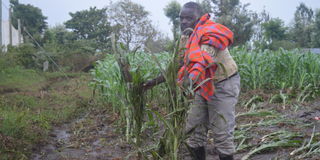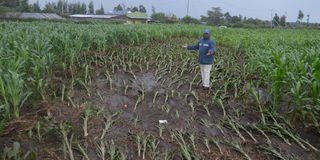Rongai farmers count losses as heavy rains fall

A farmer, Luka Koech shows some of the destroyed maize crops on his flooded farm in Sumek location in Rongai sub-county, Nakuru County on June 24, 2022. Heavy rains have been pounding the area destroying hundreds of hectares of crops and forcing farmers to incur huge losses.
After a prolonged drought, Ms Elizabeth Oute was looking forward to a bumper maize harvest.
Not anymore, after flash floods destroyed her only hope of maize on her quarter-acre farm.
Ms Oute is now staring at another season of drought and hunger and depending on food aid from donors and well-wishers after the rains destroyed the entire maize plantation on her small farm in Kwa Margaret in Rongai sub-county, Nakuru County, at the weekend.
Besides destroying her crops, the runoff water destroyed her perimeter wall, which she had constructed to keep off goats and cows that used to invade her farm and eat young crops.

A farmer, Isaac Barchok walks on a flooded farm in the Sumek location in Rongai sub-county, Nakuru County on June 24, 2022. Heavy rains pounded the area, destroying hundreds of hectares of crops and forcing farmers to incur huge losses.
"I don't know what I will feed my children after the floods destroyed my maize plantation. I have spent more than Sh20,000 to prepare the land alone while the construction of the fence cost me more than Sh100,000. I appeal for well-wishers to help me," she said.
Mr Luka Koech, who has lived in the area for more than 40 years, said he was expecting a bumper harvest by September.
"I have incurred huge losses of about Sh100,000 as the prices of seeds, fertiliser and cost of land preparations are very expensive due to inflation," said Mr Koech.
Apart from the destruction of maize on his three-quarter acre, Mr Koech said the floods destroyed his pit latrine.
"It is very risky to have a homestead without a pit latrine as it could lead to an outbreak of cholera," said Mr Koech.
The smallholder farmer said that he lost 12 chickens, which were swept by floods after water submerged the backyard chicken coop.
"I woke up early in the morning and I thought the chickens had jumped out of the coop and gone outside to feed only to find their carcasses stuck in the mud while others were eaten by stray dogs," he added.
Mr Isaac Barchok, another resident, said the flooding was exacerbated by a lack of trenches and terraces on a neighbouring large-scale farm where the floods started.
"There is a stream nearby which the owners of the large-scale farm would have directed the water to reduce the ferocity of the flood waters," said Mr Barchok.
A nearby horticultural farm is also counting losses after the floods washed away thousands of citrus seedlings that were almost ready to be transferred to the farms.
"I had orders of more than Sh500,000 and this means the orders will now be cancelled. Some of the clients had paid a down payment and it means I will have to refund them their deposit. I want to retain my clientele base," said the farm owner.
He added: "This flooding has taught me the importance of insuring my crops. If I had insured my crops I would have been easily compensated against floods and other risks. I would have used the payout to quickly replant new seedlings and get back on her feet.”
Several acres of vegetables such as spinach ready for harvesting and various varieties of fruits were also submerged as flood waters spread far and wide on adjacent farms.

A farmer, Elizabeth Oute in Sumek location in Rongai sub-county, Nakuru County shows a collapsed perimeter wall on her farm on June 24, 2022, following floods that hit the area. Heavy rains have been pounding the area destroying hundreds of hectares of crops and forcing farmers to incur huge losses.
Climate change is slowly magnifying the risk from extreme weather events and the most vulnerable to floods are the hundreds of smallholder farmers in the region as floods destroy hundreds of acres of their crops annually.
This is the second time that crops were damaged due to flooding in the region.
Last year, farmers saw their crops worth thousands of shillings damaged in heavy rain.
Farmers complained that despite the disaster caused by rain and flooding, the authorities concerned had not taken any action to mitigate the yearly occurrence.
"We have incurred losses amounting to thousands of shillings due to repeated flooding in the region. However, we haven't received any compensation from the agriculture department," said one of the affected farmers.
"Agriculture is a devolved function and the department should take action and advise farmers on how to prevent flooding. A permanent solution has to be found by the department because we are facing climate change."
Farmers have been struggling due to two consecutive floods in the region and the losses are mounting. Agriculture department officials had not visited the area to assess the damage.





